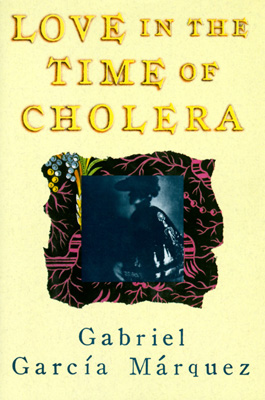
One of the things I like about following 'The List' is that it encourages me to finally read books by authors whose work I am familiar with, but have not read. Toni Morrison was one such author and Gabriel Garcia Marquez is another. I read his non-fiction News of a Kidnapping several years ago and enjoyed it very much, but this was my first foray into his fiction.
Love in the Time of Cholera is one of Marquez's best known works. It has been an Oprah choice, a major motion picture, and is the book people seem to mention most often in relation to this Colombian writer. The story literally covers the lifetime span of the major characters, the lovesick Florentino Ariza and his fifty year obsession with Fermina Daza. The book takes place in the late nineteenth and early twentieth century in an unnamed city on the Mediterranean. Florentino Ariza was the youthful suitor of Fermina Daza who took great pleasure in clandestine correspondence and hopeful talk of the future with Florentino. However, maturity and events lead her instead to marry Dr. Juvenal Urbino, a well-connected local doctor and philanthropist. Florentino Ariza decides to 'wait' for Fermina Daza, hoping that someday, should the good doctor die, she will eventually be his. Florentino has 600 'temporary' flings while waiting for her and leads what appears to be a conventional life to the outside world. However, his entire existence is based around waiting. And waiting. And waiting for Fermina Daza.
The book is a beautiful but challenging read. There is almost no dialogue and the detailed descriptions can be off-putting for some readers. I found that as long as I had a solid chunk of time to devote to it, the novel was great to read. This is definitely not one to pick up in dribs and drabs.
The best thing about this book for me was the subtext. On the surface, it is a relatively straight-forward meditation on the power and endurance of love. Still, I feel that there is a lot more happening than that. The character of Florentino Ariza inspires our sympathy, but when his actions are looked at objectively, he comes off more like a deranged stalker and terrible user of women- not the romantic figure he cuts on a surface reading. The book also tackles some of the enduring questions about old age and the many different faces of love. Definitely worthwhile to read, and one I've spent a lot of time thinking about since I put it down.

